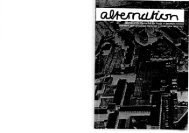Re-reading The Purloined Letter - Alternation Journal
Re-reading The Purloined Letter - Alternation Journal
Re-reading The Purloined Letter - Alternation Journal
You also want an ePaper? Increase the reach of your titles
YUMPU automatically turns print PDFs into web optimized ePapers that Google loves.
387<br />
<strong>Re</strong>-<strong>reading</strong> <strong>The</strong> <strong>Purloined</strong> <strong>Letter</strong><br />
interest of fairness note that Lacan did devote considerable theoretical effort<br />
to them. <strong>The</strong> point is that Lacan asserted the primacy of the symbolic over<br />
the imaginary, and Derrida sees the imaginary as swallowing the symbolic.<br />
Thus, we find Derrida accusing Lacan of everything his psychoanalytic<br />
adversaries have criticized him for: the overevaluation of the Oedipus<br />
complex, the overestimation of the phallus, overintellectualizing, being too<br />
interested in philosophy, failing to take into account the pre-oedipal fears of<br />
corporeal fragmentation, failing to give place and importance to the ego;<br />
there is even a sense that Lacan is being accused of giving insufficient place<br />
to affects. What is Derrida’s scriptural strategy and to what is he opposed?<br />
That is not a very difficult question to answer. Certainly Le Facteur de la<br />
Verite is an overwritten and overwrought text that reads like an indictment. It<br />
constantly repeats the same charges, piling up evidence of tendencies that<br />
appear to be deserving of condemnation. <strong>The</strong> tone is moral and the text is<br />
animated almost throughout by a seemingly indubitably correct moral<br />
passion. Ultimately, that is the secret appeal of deconstruction. <strong>Re</strong>garding<br />
deconstruction, Žižek (1992:25) postulates the following:<br />
Since this recourse to common sense takes place more often than<br />
one might suspect, systematically even, within the ‘deconstruction’,<br />
one is tempted to put forward the thesis that the very fundamental<br />
gesture of ‘deconstruction’ is in a radical sense commonsensical.<br />
<strong>The</strong>re is namely an unmistakable ring of common sense in the<br />
‘deconstructionist’ insistence upon the impossibility of establishing<br />
a clear cut difference between empirical and transcendental, outside<br />
and inside, representation and presence, writing and voice; in its<br />
compulsive demonstration of how the outside always already smears<br />
over the inside, of how writing is constitutive of voice, etc. etc.—as<br />
if ‘deconstructionism’ is ultimately wrapping up commonsensical<br />
insights into an intricate jargon.<br />
Žižek considers it to be one of the reasons that it is so successful in the USA<br />
which he views as the land of common sense.<br />
Underpinning Derrida’s critique of Lacan’s essay on Poe is a much<br />
wider discussion about the relationship between deconstruction and<br />
psychoanalysis, a complex issue which rests upon Derrida’s <strong>reading</strong> of

















